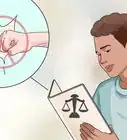This article was written by Casey Lee and by wikiHow staff writer, Aly Rusciano. Casey Lee is a Licensed Professional Counselor and Founder of Rooted Hearts Counseling LLC. With over a decade of experience, he specializes in facilitating growth and healing through co-creating safe and secure connections with couples. Casey holds an MA in Clinical Counseling from Columbia International University and is certified in Emotionally Focused Therapy (EFT) which he uses with all his couples. He is also a Level 2 Accelerated Experiential Dynamic Psychotherapist (AEDP) Therapist and a Level 1 trained Sensorimotor Psychotherapy Therapist. Casey is a member of the International Center for Excellence in Emotionally Focused Therapy, the National Board of Certified Counselors, and an affiliate member of the American Association of Marriage and Family Therapy.
There are 7 references cited in this article, which can be found at the bottom of the page.
This article has been viewed 6,109 times.
Does something about your friend, partner, or family member feel off? Are you constantly questioning yourself when you’re around them? You’ve heard the term "narcissist" before, but they can’t possibly be a narcissist when they’re so shy and introverted...right? Actually, narcissism comes in many forms. Covert narcissists have the same traits as overt narcissists (the type you’ve probably seen on TV), only watered down. So how do you know if someone is a covert narcissist? Check out our list of weird things covert narcissists do to get their way (and get tips on how to deal with them).
This article is based on an interview with our licensed professional counselor, Casey Lee, founder of Rooted Hearts Counseling LLC. Check out the full interview here.
Things You Should Know
- Narcissism is an umbrella term, and covert narcissists are more subtle in their actions, typically more introverted, and have a superiority complex.
- A covert narcissist will make themselves appear grander, more powerful, and more confident to mask their insecurities.
- Looking good on the outside is a covert narcissist’s main priority, even if they are passive-aggressive and emotionally abusive behind closed doors.
Steps
They’re passive-aggressive.
-
The silent treatment and blame-shifting help narcissists feel superior. Covert narcissists are not typically aggressive, but they’ll be subtly passive-aggressive to get what they want. They may give someone the silent treatment, make backhanded compliments, or subtly shift blame to make themselves look good.[1] X Trustworthy Source Simply Psychology Popular site for evidence-based psychology information Go to source
- For instance, they may make elusive compliments about your weight, appearance, or eating habits.
- Deal with passive-aggressive behavior by remaining calm and factual. Reacting can help a covert narcissist gain power over you.
They deliberately forget what you say.
-
“Forgetting” to do things is a part of a narcissist’s routine. Covert narcissists have their own agenda, and if what you ask of them doesn’t align with that, they’ll simply “forget” to do it. If their forgetfulness becomes a pattern, chances are they’re a covert narcissist.
- Be assertive when you respond to their forgetfulness. Remember, what you want and need is important, too.
They don’t take responsibility.
-
A narcissist tends to blame others for their mistakes. No matter what they do, a covert narcissist won’t take responsibility for their actions. They never feel like they’re in the wrong, so they’ll subtly manipulate and gaslight you to feel better about themselves.[2] X Trustworthy Source Simply Psychology Popular site for evidence-based psychology information Go to source
- If you feel like you’re always taking the blame for them, try taking a step back and looking at it from a new perspective. First, acknowledge if you have done anything wrong. Then, consider why they may be acting this way.
They lie and give fake apologies.
-
Covert narcissists will fib to make things go their way. The lies they tell aren’t elaborate—they may be as simple as saying if they’ve done the dishes. But they’ll twist the truth to match their agenda, then respond with an insincere apology if caught.
- Call them out on their lie by saying, “I know what I saw” or “You always have to be right about everything.”[3] X Research source
- When dealing with a narcissist, it’s important to have a support system. Reach out to friends, family, or a counselor you trust to talk things through and gain new perspectives.[4] X Trustworthy Source Simply Psychology Popular site for evidence-based psychology information Go to source
They’re obsessed with their reputation.
-
A narcissist worries about how people look at them. In their eyes, they have to be perfect with a pristine reputation. This might look like donating to a charity or cause, knowing their name will be read off publicly. They need people to believe they’re good.[5] X Trustworthy Source Cleveland Clinic Educational website from one of the world's leading hospitals Go to source
- Try not to acknowledge their dutiful acts if you know they’re done with the wrong intentions. Instead, appear almost bored by them, so the narcissist has nothing to feed off of.[6] X Research source
They put themselves first.
-
Covert narcissists are selfish and put their needs above others. Narcissists struggle with empathy. Because of this, they often think of themselves first rather than their friends, partner, or family.
- This behavior can be physical or mental. Perhaps they always walk ahead of you or bring up something upsetting before a big event.
- Sometimes, the best way to deal with a narcissist is to distance yourself. This isn’t always accessible, but even the smallest bit of space can help you regather your thoughts and pave the way toward a meaningful conversation.[7] X Trustworthy Source Simply Psychology Popular site for evidence-based psychology information Go to source
They have a big ego.
-
Narcissists crave attention and power. Because of this, they have a rather large ego, thinking they’re somewhat better than everyone else.[8] X Trustworthy Source Simply Psychology Popular site for evidence-based psychology information Go to source They may belittle your opinion or take control in almost every situation because they feel like they’re the best.
- A covert narcissist may be drawn to totalitarian leaders because of this, as they value dominance and control.
- It may be hard, but you need to protect yourself first. If someone’s behavior is making you feel small, maybe it’s time to take a step back or move on from the relationship.[9] X Trustworthy Source Cleveland Clinic Educational website from one of the world's leading hospitals Go to source
They’re self-deprecating.
-
Covert narcissists use their insecurities to fish for compliments. They’re insecure about themselves, so they constantly seeking validation and attention. They’ll purposefully play down their skills or achievements to receive outwardly praise and reassurance.[10] X Trustworthy Source Simply Psychology Popular site for evidence-based psychology information Go to source
- Look out for phrases like, “I’m a bad person” or “My life is meaningless.”
- Try your best not to play into this “woe is me” act. If you don’t take a covert narcissist’s bait, they’ll eventually stop fishing.
- Respond with something like, “I’m sorry you feel that way” to reset the situation.
They can’t take criticism.
-
A covert narcissist doesn’t like to be told they’re anything but perfect. They’ve got one big ego and hate it when it’s knocked down. If you offer any advice or criticism on their appearance, behavior, or hobbies, they may lash out or suddenly become distant.[11] X Trustworthy Source Simply Psychology Popular site for evidence-based psychology information Go to source
- Criticism damages their idealized image of themselves, so they’ll dismiss any negative comments.
- Covert narcissists rarely have a go-getter attitude and will blame others for their lack of success.[12] X Research source
- Ask yourself if continuing to critique and confront them is worth it. If they’re willing to listen and change, amazing! If they’re not, maybe you should stop trying to help.
They have multiple personalities.
-
Covert narcissists will put on a show to please whoever they’re around. You may notice that their personality changes depending on who they’re around. This is their way of masking their insecurities, but it can make you question who the real them is.[13] X Research source
- Set boundaries with a covert narcissist to stop their tactics and hold them accountable.[14] X Trustworthy Source Simply Psychology Popular site for evidence-based psychology information Go to source This could be as simple as not reaching out to you after a certain time or avoiding a specific topic in conversation.
They shower you with affection.
-
Narcissists will continuously praise you. They may leave notes for you in the bathroom or send you sweet texts throughout the day. It seems innocent enough, but it’s a convert narcissist’s way of buttering you up. This way, when a red flag pops up, it’ll be easier to dismiss because how could someone as doting as them be toxic?
- Keep in mind that every gift a covert narcissist gives you (whether physical or emotional) can have a price, as they could use their “kindness” to manipulate you in the future.
- Be cautious if you notice this love bombing behavior, and gently express why the behavior worries you.
They’re competitive.
-
A covert narcissist needs to prove they’re better than everyone else. They’re always up for a challenge, especially in public. They want to come off as the best, even if it means looking arrogant or cocky—they like the adrenaline rush the attention gives them.
- They’re also sore losers because of this, and you may find it difficult to play any type of friendly game with them.
- Reassure them that they don’t need to win or show off to prove themselves to you. We all have insecurities, but they don’t have to control us.[15] X Trustworthy Source Cleveland Clinic Educational website from one of the world's leading hospitals Go to source
They’re hypocritical and arrogant.
-
Narcissists will say one thing and do another. It’s difficult for covert narcissists to empathize, and their insecurities and anxieties may cause them to be wishy-washy with their beliefs. They might preach one idea and then go against it the next day because they “know better.”[16] X Research source
- Covert narcissists need validation and will often dismiss the opinions and knowledge of others.
- We know this behavior can be beyond frustrating, but try not to acknowledge it. Covert narcissists seek validation, and the more attention you give them, the more likely they are to continue manipulating.[17] X Research source
They’re always the victim.
-
No matter what, a covert narcissist will victimize themselves. They’re never in the wrong, even if they instigate a situation. They may gaslight you into thinking you’re at fault, despite knowing deep down that you’re not.[18] X Research source
- This is a defense mechanism against their own faults and wrongdoings. They’re insecure, and putting others down can help them feel better.
- Make sure they don’t silence you—your voice deserves to be heard, and your experiences are valid.[19] X Trustworthy Source Cleveland Clinic Educational website from one of the world's leading hospitals Go to source
They micromanage.
-
To a narcissist, it’s their way or the highway. They like things to be done in a particular order or way. Even if they ask you to do something by yourself, you may notice them hovering over you.
- Try diffusing the situation by saying something like, "How about we try it a different way this time?" or "Things can be done differently and still be great. Let me show you."
- If a covert narcissist does something rude or unkind, gently point it out to them. They may not realize what they’re doing is hurting you—there’s always room for a covert narcissist to change, as long as they’re willing to do the work.[20] X Trustworthy Source Simply Psychology Popular site for evidence-based psychology information Go to source
You Might Also Like
 50+ Ways to Wish Someone a Bright Future & Good Luck
50+ Ways to Wish Someone a Bright Future & Good Luck
 How to Answer “How’s It Going?” in Any Situation
How to Answer “How’s It Going?” in Any Situation


 How to Roast People: Finding Joke Ideas, Crafting Punchlines & More
How to Roast People: Finding Joke Ideas, Crafting Punchlines & More
 What He Thinks When You Don't Contact Him
What He Thinks When You Don't Contact Him



 How to Manifest Love with a Specific Person
How to Manifest Love with a Specific Person


 What to Say When Someone Has a Family Emergency
What to Say When Someone Has a Family Emergency

References
- ↑ https://www.simplypsychology.org/covert-narcissism.html
- ↑ https://www.simplypsychology.org/covert-narcissism.html
- ↑ https://www.psychologytoday.com/us/blog/ambigamy/202002/how-humiliate-absolute-narcissist
- ↑ https://www.simplypsychology.org/covert-narcissism.html
- ↑ https://health.clevelandclinic.org/covert-narcissism/
- ↑ https://www.psychologytoday.com/us/blog/here-there-and-everywhere/202112/how-handle-covert-narcissist-during-family-gatherings
- ↑ https://www.simplypsychology.org/covert-narcissism.html
- ↑ https://www.simplypsychology.org/covert-narcissism.html
- ↑ https://health.clevelandclinic.org/covert-narcissism/
- ↑ https://www.simplypsychology.org/covert-narcissism.html
- ↑ https://www.simplypsychology.org/covert-narcissism.html
- ↑ https://youtu.be/mNFIQ46-s-A?t=315
- ↑ https://www.theguardian.com/lifeandstyle/2021/aug/01/not-all-narcissists-are-grandiose-the-vulnerable-type-can-be-just-as-dangerous
- ↑ https://www.simplypsychology.org/covert-narcissism.html
- ↑ https://health.clevelandclinic.org/covert-narcissism/
- ↑ https://youtu.be/mNFIQ46-s-A?t=259
- ↑ https://www.theguardian.com/lifeandstyle/2021/aug/01/not-all-narcissists-are-grandiose-the-vulnerable-type-can-be-just-as-dangerous
- ↑ https://www.theguardian.com/lifeandstyle/2021/aug/01/not-all-narcissists-are-grandiose-the-vulnerable-type-can-be-just-as-dangerous
- ↑ https://health.clevelandclinic.org/covert-narcissism/
- ↑ https://www.simplypsychology.org/covert-narcissism.html
- ↑ https://www.simplypsychology.org/covert-narcissism.html
- ↑ https://health.clevelandclinic.org/covert-narcissism/
About This Article




























































